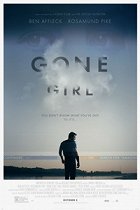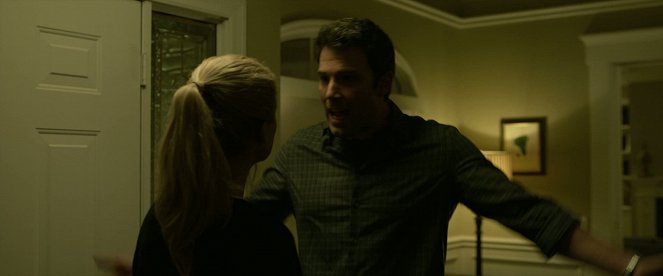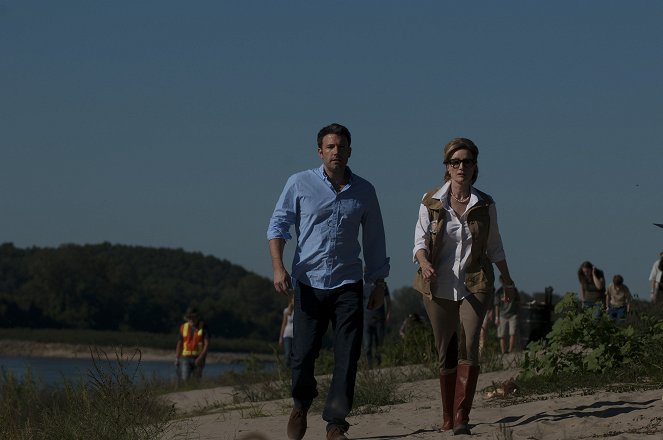Directed by:
David FincherScreenplay:
Gillian FlynnCinematography:
Jeff CronenwethCast:
Ben Affleck, Rosamund Pike, Neil Patrick Harris, Tyler Perry, Carrie Coon, Kim Dickens, Patrick Fugit, David Clennon, Lisa Banes, Missi Pyle, Emily Ratajkowski (more)VOD (2)
Plots(1)
GONE GIRL unearths the secrets at the heart of a modern marriage. On the occasion of his fifth wedding anniversary, Nick Dunne (Ben Affleck) reports that his beautiful wife, Amy (Rosamund Pike), has gone missing. Under pressure from the police and a growing media frenzy, Nick's portrait of a blissful union begins to crumble. Soon his lies, deceits and strange behavior have everyone asking the same dark question: Did Nick Dunne kill his wife? (20th Century Fox)
(more)Videos (2)
Reviews (18)
I haven't seen a movie this suspenseful in a long, a truly long time. It's so terribly suspenseful that after the first line I was ready to rewind the film to the end to see how it would turn out. It blends so many things that I love in movies. Unexpected twists and turns, engaging narration from the main heroine, and... one big game. And the best part is the insightful, even clinical way in which it's filmed. I have no complaints about the cast either. I'm simply and plainly blown away and if anyone asks me for a movie recommendation this year, this one will immediately jump out at me. Anyway, I'm off to buy the book this weekend. 5 stars.
()
Spoilers ahead. A five-act play about marriage and engaging storytelling. The film not only preserves the book’s “he said/she said” structure, but further thematises the telling of various versions of the same story through words and images. From the storytelling perspective, Gone Girl is notable in both how the film communicates with the viewer and how the individual narrative segments communicate with each other. One gets the impression that the information in Amy’s diary is a response to what Nick is experiencing and vice versa. The diary flashbacks trigger events in the present (the discovery of Amazing Amy’s artifacts) and the returns to the present are handled with fluid graphic transitions (the kiss – wiping of the mouth), thanks to which the shots organically complement each other. As the co-creator of Nick’s story, Amy is thus seemingly present even in scenes in which she does not physically appear (in the book, this impression is achieved through Nick’s feeling that Amy is looking over his shoulder and commenting on the text of the novel that he is writing). Thanks to the “cooperation” between the information from the past and that from the present, both storylines can serve to convey evidence supporting the intensification of the police investigation (which Flynn does not needlessly delay here, making better use of it than in the book to tighten up the narrative). Similar communication takes place at a higher level between the first and second parts of the film. In the second part, there are variations on scenes from the first part, with a different allocation of the roles of prey and predator (first Nick and then Amy suspects that someone is moving around in front of the house) and different motivations for their actions (the goal of “finding Amy” remains, but until the final act, it is not her life that is in danger, but Nick’s). ___ Like the composition of some of the shots, which are terrifying in how inhumanly perfectly centred they are, the similarity of whole scenes is confirmation of Fincher’s obsession with symmetry. Even so, I don’t consider the moral relativism of either the book or the film to be as well-honed as their creators would have liked. Against a sadomasochistic sociopath and murderer stands a rather ordinary guy who “only” lies, treats his own father like shit and has been unfaithful to his wife. ___ I suspect that the negative depiction of the female protagonist was the reason that the book appealed to Fincher. Nevertheless, women who have been betrayed may feel a certain satisfaction from the fact that Amy exclusively uses feminine weapons to symbolically castrate her husband (for which we are prepared by Go’s “Protect Your Nuts” T-shirt in the opening scene). Her power does not consist in thinking and acting like a man. ___ Fincher’s handling of the audio-visual form of every shot is more masterful from film to film. Minor adjustments in colour, pacing and shot size are used to adapt the overall noirish atmosphere with cold colours into a clinical police procedural here, a toxically cynical relationship satire there (along the lines of Who's Afraid of Virginia Woolf?) and even a splatter flick. Instead of switching between thriller, biting social commentary and dark comedy, these individual types are layered on top of each other, so that we can view each scene from multiple (genre) perspectives and admire the precision with which Fincher takes care to ensure that none of the genres dominates and that the viewer cannot experience the satisfaction that comes with the fulfilment of a particular formula. The ending is as unsatisfying (in the sense of not being a typical Hollywood ending) as what the film says about certainty in marriage and honesty in relationships generally. 85%
()
(less)
(more)
Bitching about Fincher playing it safe is like badmouthing Jagr for his hockey finesse and scoring goals. This narrative, directed with the precision of a neurosurgeon, for whom the camera is the scalpel and the music the anesthetic, precisely doses the marital crisis with a cool detachment, in which the apparent waters of detachment are navigated by actors who have every letter of the script pinned directly to their bodies. Affleck's worldliness with the hallmark of a small-town dweeb works, but Rosamund Pike reigns supreme. Their interaction is something you experience on screen once or twice every three years. It’s a perfectly polished film that knows it and isn't ashamed of it. The first and last shots are divine.
()
So this is the drama that made everyone pee their pants in bliss? It's impersonal, cold, both of them deserve to be slapped. I liked the character of the detective and the sister of the accused the best – there seemed to be some character to them. But otherwise it's like walking through a fog. It might feel nice at first, coming out of the warmth of your home, but as time goes on you realize you can't actually see anything and you feel the same thing all the time. No twist. Nothing to delight you. It's a film about how manipulation, callousness, and emotional apathy win out. Is that a reflection of the US? Europe? The world? When I think about it that way, it's disgusting. But that's about the only emotion the film evoked in me. Otherwise, nothing. A blank void. In the fog. But it's shot with precision, no question.
()
Who wouldn't want to open their wife's skull and see what's going on inside it? Best Fincher since 2007. Especially the first half is brilliant. The way in which Fincher managed to elegantly embody two unreliable book narrators into exciting cinematic speech is worthy of (un) academic admiration. Especially since the film does not achieve the stratification and urgency of the book, but it is able to balance it with predatory irony and scathing exaggeration. Criticism of the crises of a troubled society, which is oriented only by reflections and media images, is carried out with ease and without any lameness. I have problems more so with the second half, which is slightly camp, and, especially through the irresistibly psychopathic caricature of the main character, the film makes its work a little easier when it runs from subtle social criticism and attentive satire of a marital crisis to shocking twists. Moreover, in some of the "dark" scenes, it seems as if Ben Affleck (deprived of the opportunity to defend himself with his smile) reaches the limits of his acting. I can't say that Fincher convinces me indefinitely about the meaningfulness of all of the parts of his game, but I admit, without torture, that even taking into account the complexity of the original and all the pitfalls of the material, my initially slightly indifferent attitude transformed into deep recognition. I’d like to watch this Gone Bitch again after some time has passed.
()


